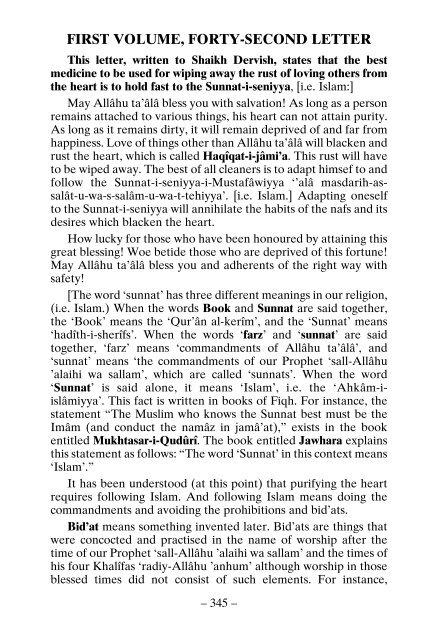O Son !
THE BOOK ‘O SON’ Al-hamdu lillâhi Rabbil ’âlamîn. Wa-s-salâtu wa-s-salâmu ’alâ Rasûlinâ Muhammadin wa Âlihi wa Sahbihi ajma’în. 1– O son! Collecting from books written by the scholars of the Hanafî Madhhab three hundred and sixty hadîth-i-sherîfs and forty-four khabars and also the seven essentials and the five rukns and the seven wâjibs and the fourteen sunnats and the twenty-five mustahabs and the fourteen mufsids of namâz, I have explained them for you. Adapt your acts and deeds to these teachings so that you attain fayz and nejât (salvation)! 2– Also for your information, I have collected a thousand and ninety âdâb (adabs) for you and for other young Muslims like you. If you adapt your actions and acts of worship to these teachings, they will be sufficient for you. If you laze, disobey Allâhu ta’âlâ and cease from these practices and manners, you will be afflicted with slavery and disgrace in the world and subjected to torment in the world to come. If you live up to them and advise your Muslim brothers to do the same, it will be useful for you. They will say blessings over you. And Haqq ta’âlâ will accept their invocations. For, a slave will be pardoned on account of another slave’s invocations for them.
THE BOOK ‘O SON’
Al-hamdu lillâhi Rabbil ’âlamîn. Wa-s-salâtu wa-s-salâmu ’alâ
Rasûlinâ Muhammadin wa Âlihi wa Sahbihi ajma’în.
1– O son! Collecting from books written by the scholars of the
Hanafî Madhhab three hundred and sixty hadîth-i-sherîfs and
forty-four khabars and also the seven essentials and the five rukns
and the seven wâjibs and the fourteen sunnats and the twenty-five
mustahabs and the fourteen mufsids of namâz, I have explained
them for you. Adapt your acts and deeds to these teachings so that
you attain fayz and nejât (salvation)!
2– Also for your information, I have collected a thousand and
ninety âdâb (adabs) for you and for other young Muslims like you.
If you adapt your actions and acts of worship to these teachings,
they will be sufficient for you. If you laze, disobey Allâhu ta’âlâ
and cease from these practices and manners, you will be afflicted
with slavery and disgrace in the world and subjected to torment in
the world to come.
If you live up to them and advise your Muslim brothers to do
the same, it will be useful for you. They will say blessings over you.
And Haqq ta’âlâ will accept their invocations. For, a slave will be
pardoned on account of another slave’s invocations for them.
Create successful ePaper yourself
Turn your PDF publications into a flip-book with our unique Google optimized e-Paper software.
FIRST VOLUME, FORTY-SECOND LETTER<br />
This letter, written to Shaikh Dervish, states that the best<br />
medicine to be used for wiping away the rust of loving others from<br />
the heart is to hold fast to the Sunnat-i-seniyya, [i.e. Islam:]<br />
May Allâhu ta’âlâ bless you with salvation! As long as a person<br />
remains attached to various things, his heart can not attain purity.<br />
As long as it remains dirty, it will remain deprived of and far from<br />
happiness. Love of things other than Allâhu ta’âlâ will blacken and<br />
rust the heart, which is called Haqîqat-i-jâmi’a. This rust will have<br />
to be wiped away. The best of all cleaners is to adapt himsef to and<br />
follow the Sunnat-i-seniyya-i-Mustafâwiyya ‘’alâ masdarih-assalât-u-wa-s-salâm-u-wa-t-tehiyya’.<br />
[i.e. Islam.] Adapting oneself<br />
to the Sunnat-i-seniyya will annihilate the habits of the nafs and its<br />
desires which blacken the heart.<br />
How lucky for those who have been honoured by attaining this<br />
great blessing! Woe betide those who are deprived of this fortune!<br />
May Allâhu ta’âlâ bless you and adherents of the right way with<br />
safety!<br />
[The word ‘sunnat’ has three different meanings in our religion,<br />
(i.e. Islam.) When the words Book and Sunnat are said together,<br />
the ‘Book’ means the ‘Qur’ân al-kerîm’, and the ‘Sunnat’ means<br />
‘hadîth-i-sherîfs’. When the words ‘farz’ and ‘sunnat’ are said<br />
together, ‘farz’ means ‘commandments of Allâhu ta’âlâ’, and<br />
‘sunnat’ means ‘the commandments of our Prophet ‘sall-Allâhu<br />
’alaihi wa sallam’, which are called ‘sunnats’. When the word<br />
‘Sunnat’ is said alone, it means ‘Islam’, i.e. the ‘Ahkâm-iislâmiyya’.<br />
This fact is written in books of Fiqh. For instance, the<br />
statement “The Muslim who knows the Sunnat best must be the<br />
Imâm (and conduct the namâz in jamâ’at),” exists in the book<br />
entitled Mukhtasar-i-Qudûrî. The book entitled Jawhara explains<br />
this statement as follows: “The word ‘Sunnat’ in this context means<br />
‘Islam’.”<br />
It has been understood (at this point) that purifying the heart<br />
requires following Islam. And following Islam means doing the<br />
commandments and avoiding the prohibitions and bid’ats.<br />
Bid’at means something invented later. Bid’ats are things that<br />
were concocted and practised in the name of worship after the<br />
time of our Prophet ‘sall-Allâhu ’alaihi wa sallam’ and the times of<br />
his four Khalîfas ‘radiy-Allâhu ’anhum’ although worship in those<br />
blessed times did not consist of such elements. For instance,<br />
– 345 –

















